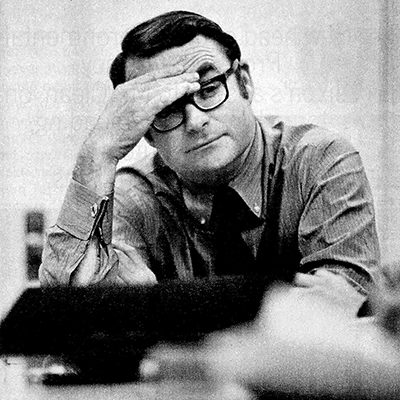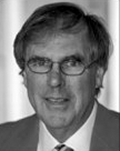William Ruckelshaus – "Who?"
|
William Ruckelshaus on the balcony outside his corner office for the Madrona Investment Groupin downtown Seattle. His first big decisioin as the first head of the Environmental Protection Agency was whether or not to ban DDT, in part because it might kill raptors. He says a while ago, a peregrine falcon nested on the balcony. "I think the falcon was allowing me to share his life as a way of thanking me for the DDT decision." Photo by Bill Ganzel, November 2012.
|
|
"Ruckelshaus, bone-tired, listens to students. 'To kids, this environment's a spiritual thing #&150; they believe technology's run amok, and we've got to slow it down.'" Photo by Joel Baldwin, from the May 4, 1971, edition of LOOK. |

|
|
|
In May 1970, LOOK introduced the nation to the first head of the Environmental Protection Agency (EPA) by asking "Who?" he was. But they had no doubt that the country would demand that he become a forceful head of the country's efforts to protect the environment. "Here's the guy who sites on about the hottest seat in the United States," LOOK senior editor Jack Shepherd wrote. But Ruckelshaus came to Washington from a prominent political family and his own accomplishments in Indiana. He served as a drill sergeant during the mid-50s, and earned degrees from Princeton and Harvard Law. He worked for the Indiana attorney general office and pursued pollutors of the state's water supply. He also helped draft the 1961 Indiana Air Pollution Control Act. He began running for state-wide offices as a Republican. In 1969, Pres. Richard Nixon appointed him as Assisstant Attorney General in the civil division. At the end of 1970, Nixon tapped him to head the EPA. |
|
One of Ruckelshaus' first major decisions as head of the EPA was whether or not to ban DDT. Scientists and journalists had been showing how the pesticide was killling birds as well as the insects it was intended to attack. Ruckelshaus banned the chemical. In April 1973, he was swept up into the Watergate affair. More and more Nixon administration officials were losing their jobs, so the president appointed Ruckelshaus acting director of the FBI and then Deputy Attorney General. In October 1973, Pres. Nixon ordered Ruckelshaus and his boss, AG Elliot Richardson, to fire the special prosecutor investigating Watergate, Archibald Cox. Cox was getting close to the truth of the coverup. Richardson refused to fire Cox, so Nixon fired him. Then, Ruckelshaus refused to fire Cox, and Nixon fired him. The event became known as the "Saturday night massacre." Today, Ruckelshaus – at over 80 years of age – is a principal in a venture capital firm in Seattle. In our interview, he talks eloquently about politics then-and-now, the environment and the Sixties. |





